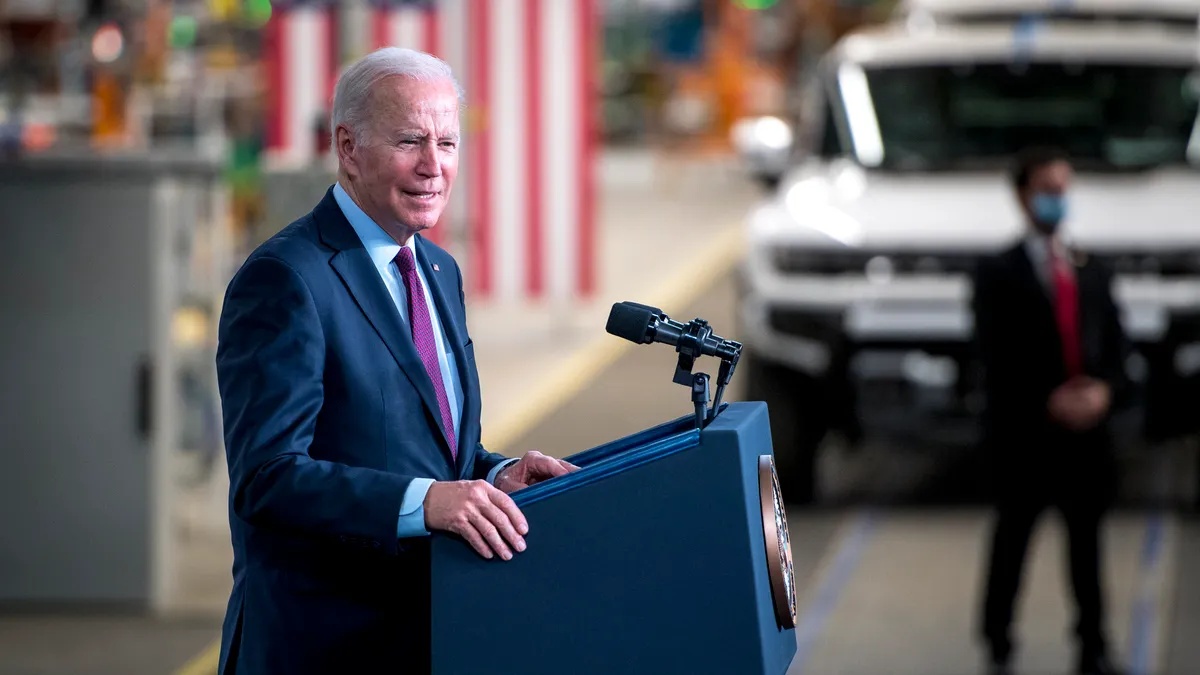Dive Brief:
- The Biden administration on Monday followed through on its proposal to make healthcare insurance companies and group health plans cover the cost of at-home COVID-19 tests.
- Starting on Saturday, people who have private health insurance coverage or who are covered by a group health plan will be able to claim up to eight over-the-counter, FDA-authorized tests a month.
- The administration is incentivizing insurers and plans to create programs that enable people to get tests from preferred pharmacies without paying upfront or needing to file a reimbursement claim. America's Health Insurance Plans said in a statement the administration's guidance "takes steps to mitigate the real risks of price gouging, fraud, and abuse" but warned of likely "hiccups" in the early days of implementation.
Dive Insight:
President Joe Biden set out plans to help the 150 million Americans with private health insurance get at-home COVID-19 tests last month. The plan looked to remove cost as a barrier to the use of tests from manufacturers such as Abbott Laboratories and Quidel, although at that stage it was unclear if all people would still need to go through an administrative process to be reimbursed.
The latest update, which comes days before the coverage requirement takes effect, fills in some of the details. Recognizing the potential for the reimbursement process to deter claims, the administration is incentivizing insurers to eliminate the upfront cost and administrative burden.
If an insurer or plan fails to provide a way for people to access tests with no upfront costs, it will need to cover whatever price its members pay for tests. A member who pays $34 for a pack of two tests will get $34 back from their insurer or plan.
Insurers and plans that have "a network of convenient options such as pharmacies or retailers, including online retailers, in which individuals on their plans can get their tests' cost covered up front," will benefit from a cap on the reimbursement of tests bought at out-of-network sites. The plan or insurer will need to pay $12, at most, of the cost of each test purchased outside of their network.
The system will still require more work from consumers than is needed in countries such as the U.K., where the government ships tests for free to people's homes, and the limit of eight tests a month is far lower than in some parts of the world. Yet, the incentives for eliminating upfront costs go some way to addressing concerns health policy experts raised when the plan first came to light last month.
Medtech lobby AdvaMed said last month when the Biden administration announced its initial plan that the actions will "go a long way toward extending the reach of quality Covid testing to the 150 million Americans with private coverage."
Other stakeholders have offered their takes on the final proposal. Matt Eyles, CEO of health insurer trade group AHIP, said insurers will work as quickly as possible to enact the guidance and minimize consumer confusion, but warned of potential implementation problems.
"We recognize that the administration's guidance takes steps to mitigate the real risks of price gouging, fraud, and abuse, which would limit access and reduce affordability for everyone. While there will likely be some hiccups in early days, we will work with the administration to swiftly address issues as they arise," Eyles said in Monday's statement.
Even if the cost barrier is eliminated, people may still struggle to access tests. On Monday, ABC News reported that supply remains "spotty in many parts of the country." Existing manufacturers such as Abbott are working to increase output of their at-home tests and other major players such as Roche and Siemens are looking to address the COVID-19 testing shortage with recent FDA authorizations of their respective over-the-counter tests.
Abbott CEO Robert Ford told the J.P. Morgan healthcare conference on Tuesday that the company is manufacturing more than 100 million tests per month globally and is looking to expand that output. Abbott is seeing a "very big surge" in testing in the U.S. and internationally, Ford said, noting that "it's a challenge to forecast."
Asked about the Biden administration's latest reimbursement actions meant to increase access to tests, Ford said the move could potentially expand the COVID-19 testing tail for the company. "That can have an opportunity here," Ford said, adding that Abbott has "plenty of capacity" across all of its products including PCR and rapid antigen diagnostics. "Testing will eventually ramp down but there will be a portion that will be sustained," he said.
The CEO told the J.P. Morgan conference Abbott will provide updated 2022 guidance on Jan. 26 when the company reports its fourth-quarter 2021 financial results. "We'll have to get comfortable with a number, a range," Ford added. "And, then from there, be able to update it as we go along throughout the year."
In October, Abbott gave a range of $1 billion to $1.4 billion in COVID-19 test sales in the fourth quarter of 2021. However, at the time, Ford warned that the coronavirus testing market remains volatile and it's going to be "very difficult" to forecast 2022.
Greg Slabodkin contributed reporting.













